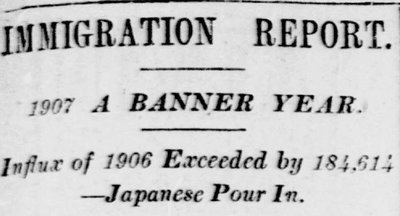
The Immigration Act of 1907 and the Gentlemen’s Agreement
The Immigration Act of 1907 expanded restrictions on Asian immigration and created the Dillingham Commision to investigate immigration-related problems and their impact on the nation. The “Gentleman’s Agreement” between the US and Japan ended the immigration of Japanese workers.
The Immigration Act of 1907 created the Dillingham Commission, which argued that in order to prioritize the economic well-being of US citizens, Congress needed to restrict immigration even further and prevent corporations from relying on unskilled immigrants for cheap labor. The commission suggested more limitations on immigration, a literacy test for incomers, continuing the Chinese Exclusion policy, and restricting immigration from other Asian countries.
The Gentleman’s Agreement arose after rising hostility to Japanese immigrants in California and specifically a discriminatory law in San Francisco aimed at Asian immigrants threatened Japan’s cooperation in reducing the number of immigrants to the US. To appease Californians and maintain positive relations with Japan as a counterpoint to Russian expansion, President Roosevelt brokered the termination of the offensive San Francisco law and persuaded the Japanese government to collaborate in effectively ending immigration of Japanese laborers.

